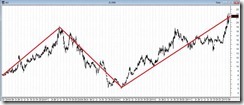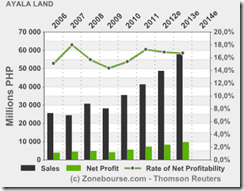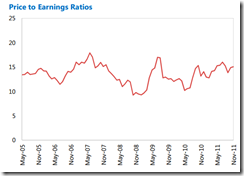Although these episodes occurred centuries ago, readers will find the events eerily similar to today's bubbles and busts: low interest rates, easy credit terms, widespread public participation, bankrupt governments, price inflation, frantic attempts by government to keep the booms going, and government bailouts of companies after the crash. Although we don't know what the next asset bubble will be, we can only be certain that the incessant creation of fiat money by government central banks will serve to engender more speculative booms to lure investors into financial ruin—Douglas French
Philippine PSEi 30: ICT’s Parabolic Share Price Moves Unsupported by 2023 Financial Performance
On ICTSI’s price blitzkrieg deviating from 2023 Financial Performance: "This is nuts. When’s the crash?"
Though ICTSI [PSE: ICT] was the first among the PSEi 30 members to submit their 2023 annual report, the near vertical price surge since the end of October 2023 has intrigued us the most.
ICT has returned 14.75% YTD (week ending March 1st) and by about 42% since (October 27th, 2023).
Figure 1
ICT is one of the "parabolic 4" that has contributed to the thrust of the PSEi 30 to the present 7,000 levels.
Put differently, ICT's parabolic move, which pushed it to the 5th largest free float market cap, has anchored a substantial segment of the PSEi 30's recent low-volume advances.
Figure 2
Paraphrasing my tweet last December 26th, "ICT is a bet on globalization. Its topline performance has resonated with Philippine external trade and global trade. But, the world's transition to a war economy translates to a realignment into trading blocs or quasi-autarky (via industrial policy, economic nationalism) or a combination thereof."
UNCTAD's trade pattern partially demonstrates this shift.
The escalating frictions from geopolitical developments exhibited by the Russia-Ukraine war, the Israel-Palestine war, the US-Houthi war, and economic war in many forms (weaponization of the US dollar, trade, investment, information, capital, technological development, cyberspace, space programs, and social mobility flows) translate to various bottlenecks in trade, logistics, and supply (shipment) flows.
Higher costs from these factors should serve as Team Transitory's (inflation) wet dreams. Unfortunately, rising supply costs won't necessarily extrapolate to a general price increase—unless supported by (demand) credit or liquidity expansion.
Instead, the likely impact is to scuttle many international Small and Medium Enterprises (SMEs) operating on low-profit margins, which should further weigh on demand.
The World Bank and the UNCTAD expect global trade to slow significantly.
We are no fans of the establishment punditry, but (global) recessionary forces combined with geopolitical dynamics could escalate economic and financial risk factors. Japan, and the UK slipped into a recession in 2H 2023.
Figure 3
In looking for clues of ICT's price behavior, we discovered that none of the share price charts of some of ICTSI's key rivals have echoed its manic share price bid: Cosco Shipping, APM Terminals, China Merchants Port Group, and CK Hutchison Holdings Limited (merged entity of Hutchison Whampoa and Cheung Kong Group).
Sure, current price actions may signify a company’s specific developments.
But, as noted above, in reference to its Q3 performance, ICT's topline performance partially manifested the Philippine external trade and global trade activities.
Figure 4
In Q4 2023, ICT suffered a second straight almost stagnant growth (up by +3.5%), nearly echoing the slump in Philippine external trade growth (-5.22%).
Figure 5In 2023, gross port revenues (6.5%) and total revenue growth (7.01%) fell to their lowest since 2020 (based on USD 000s).
Meanwhile, net income growth contracted by 14.2%.
Figure 6
And nearly typical to major PSEi components, debt servicing costs expanded 10.96% from rising rates, signified the only growth area, even as the firm's total debt slipped by 12.1%.
With PE converted into the BSP's USD-Php average in 2023, ICT's 2023 trailing PER was 21.4 (as of March 1st) based on 2023’s Php 13.54 eps, which was down from Php 15.64 in 2022 (or a decline of 15.3%).
That is, marginal players made maniacally bid on ICT prices in Q4 amidst a deterioration in fundamentals!
As it happened, the push on ICT shares represents price multiple expansion.
Or, based on its core port business operations, hardly anything seems to support the manic bidding in ICT's share prices except for three things: the adrenaline rush from FOMO (fear of missing out), unknown unknowns (insider play or magic?), and the unpublished desire by some influential groups to pump the PSEi 30 into a technical bull market—that would draw in a gullible crowd of empty bag holders.
In any case, will Newton's third law of motion—for every action (force) there is an equal and opposite reaction—eventually prevail?
To borrow a quote from the Financial Times: This is nuts. When’s the Crash?
Stay tuned.










